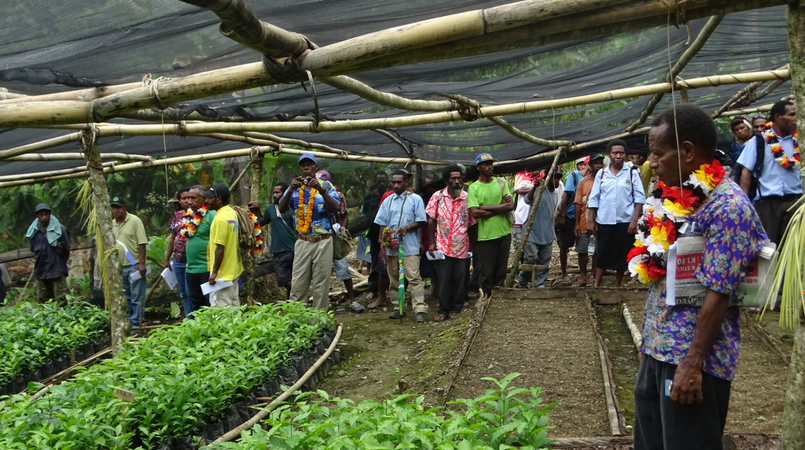
Farmers in the mountains of Erap LLG in Morobe Province taking part in coffee rehabilitation are set to add 216,827 arabica seedlings in their coffee gardens.
The seedlings are from eight nursery set-ups by eight cluster groups representing respective villages namely Torowa, Gisi, Sabang, Kalebo, Bayang, Karawang, Balawang and Tofito.
The 813 farmers from eight villages operate under Kasuka Coffee Cooperative in partnership with agri-business firm Wia Trade Enterprise Ltd, a lead partner of Coffee Industry Cooperation’s Productive Partnerships in Agricultural Project (CIC-PPAP).
The farmer group is being revived and strengthened under coffee rehabilitation partnership.
The launching of the nursery seedlings took place at Kalebo Village on Thursday 15 March, 2018, witnessed by close to 300 farmers and their families.
According to CIC-PPAP coffee experts, the seedlings are expected to produce a minimum of 540,000 kilograms of cherries after between three and five years when the trees reach full maturity or production stage.
PPAP technical officer Alphy Semy said converting to green bean, this will give just over 87,000kg or 1,450 bags enough to fill 4.5 containers.
“At today’s Y grade price of K7.50 per kg, the projected additional revenue is estimated at K650,000,” Semy stated.
“Ninety percent of this revenue will go directly to the farmers of Kasuka Cooperative.”
Wia Trade managing director, Dr Joel Waramboi, said Erap LLG currently has 314,315 coffee trees from 130 gardens covering 120.9 hectares. The annual yield from these trees is just over 700,000kg of cherries on a scale of 2.5kg per tree.
It was a proud moment for chairman of Kasuka Cooperative Benny Semoga who said Erap has awakened and is ready to supply more coffee in three years’ time and beyond.
Manager of PPAP coffee Potaisa Hombunaka, in his keynote address, urged the farmers to utilise this opportunity to improve their gardens for increased yield of high quality to earn more income to sustain their wellbeing.
Hombunaka said Morobe is a province with a large land mass and can lead in coffee production but farmers must sell to buyers and factories in Morobe Province.
Group marketing is encouraged to sell their coffee. The Lead Partner Wiatrade Ltd should begin processing their coffee to green bean and market it directly overseas expect hence increase income.
He also urged farmers to work together with lead partner Wia Trade to gain maximum benefits from their sales in terms of community services that will come with premium payments.
Wia Trade is reviving existing coffee gardens in the area as a lead partner of CIC’s coffee rehabilitation program under Productive Partnerships in Agriculture Project.
Present at the launching were provincial and district agriculture officers headed by acting provincial advisor Ken Elonaga. Also in attendance were representatives from Fresh Produce Development Authority (FPDA), chairman of various coffee cooperatives in Morobe and CIC Board.
This is a partnership project and unfortunately there was no representation from Wain-Erap District Development Authority and Morobe Governor’s office despite several requests from the farmers through their lead partner.
The coffee development work is financed by a loan facility from World Bank and IFAD or International Fund for Agricultural Development with support funding from PNG Government.
The gathering also witnessed the official opening of a resource centre built next to the nursery set-up at Kalebo, unveiling of a sign board, launching of tools like bush knives, secateurs or scissors, spades, grass knives and hand coffee pulpers for farmers to use in their gardens.
A farmer can pay on average K1,000 for all the basic tools. Under the project they pay five percent or K50 only to take ownership of the items.
Certificates were also presented to farmers through their chairman for successful participation in a coffee quality training held at Kalebo Village early this month.
(Acting Morobe Provincial Advisor for DAL, Ken Enolaga, right, and other officials and farmers visiting one of eight nursery setups at Kalebo Village after the launching)
